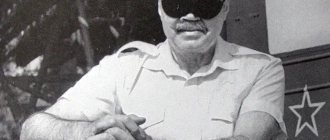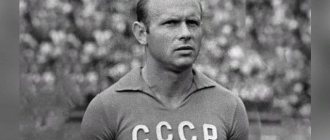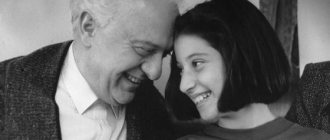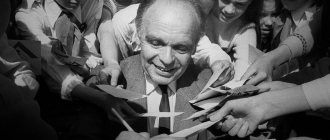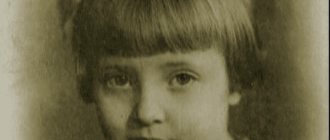Biography of Eduard Khil
Eduard Khil is a popular Soviet singer. Possessing a unique operatic baritone, he became famous thanks to his pop repertoire. The artist’s creativity flourished in the 70-80s, his songs were known and loved in all corners of our vast country. After perestroika and the collapse of the USSR, Khil’s popularity faded, but in 2010 he unexpectedly became an Internet star thanks to a simple song from the past that appealed to modern youth audiences.
In the photo: Eduard Khil
Last takeoff
The famous singer was remembered thanks to the Internet, YouTube and the American student Ray William Johnson. In 2010, he posted "Song Without Words" on his blog. “What a song! This is the singer! Yes, he could single-handedly end the Cold War!” the blogger said.
In a matter of days, the video was viewed by millions of people around the world. The 75-year-old performer gained worldwide fame. Offers to give concerts poured in from all over the world. The phone didn't stop ringing for a minute.
I had to hire a person to act as a press secretary. He talked with producers and organizers of the TV show. The pop star joked: “I’m Khil and I’m not a Khil yet.” But he refused to tour. On June 4, 2012, the great singer passed away.
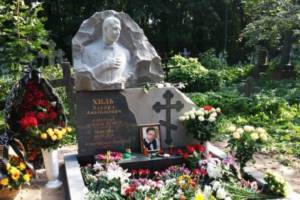
And today there are always fresh flowers on Khil’s grave at the Smolensk cemetery in St. Petersburg
VKontakte (https://vk.com/club1064371) has created a club in memory of the artist.
Childhood and adolescence
Eduard was born into an ordinary Soviet family from Smolensk. According to the documents, his date of birth is September 4, 1934, but the artist himself claimed that he was born a year earlier. During the evacuation, the birth certificate was lost, and inaccuracies crept into the new documents. The boy was named Edward by his mother, Elena Pavlovna Kalugina, an accountant by profession. And he owes his unusual surname to his father, Anatoly Vasilyevich Khil, a mechanic worker from Belarus.
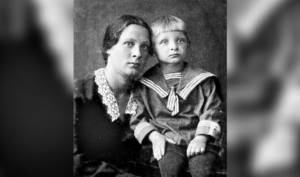
Eduard Khil with his mother
There are several versions of the origin of this surname: according to one of them, it has Old Russian roots, according to another, “hil” is a distorted Belarusian name for the bullfinch (“gil”). Edward himself liked the “Spanish” version of origin more - his Spanish ancestors, who during the War of 1812 were captured by Russians and settled near the Berezina, where his father was from, could well have served in Napoleon’s army.
By the way, from an early age the unusual surname caused the boy a lot of inconvenience. In the orphanage where he ended up during the war, for some reason they decided that he was a German and teased him as a fascist, and in Lenconcert they considered him a Jew, with all the ensuing consequences. But Edward was proud of his roots and did not even want to hear about changing his surname Khil to a simpler and more harmonious one.
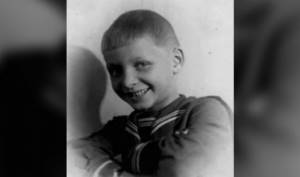
Eduard Khil in childhood
When the war began, Edik was six years old. German troops entered Smolensk, where the boy lived with his mother and stepfather, in July 1941. Literally an hour and a half before the capture of the city, all the children were urgently evacuated: first to Penza, then to Bashkiria. The mother could not find her son for a long time, and only in 1943 did it become clear that he ended up in an orphanage in the village of Raevsky near Ufa. From hunger, the boy developed dystrophy, he practically could not walk, and the woman had to carry the child in her arms across half the country.
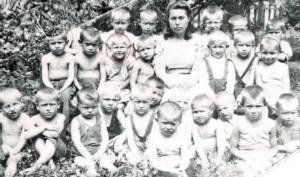
Eduard Khil in the orphanage
They came out and put Edik on his feet, although difficult childhood memories haunted him for the rest of his life. In 1946, he experienced another terrible, post-war nightmare. Residents of Smolensk, in order to survive, had to eat quinoa, beet and carrot tops, and potato peelings. According to the artist’s recollections, there were even cases of cannibalism. The city lay in ruins, the sewerage system and water supply did not work, and unsanitary conditions reigned everywhere. Criminal gangs operated on the streets; one could easily lose one’s life over a piece of bread.
But the schools worked, they even had creative clubs where war-weary children could develop their abilities. Edik was interested in singing and drawing, in 1949 he won a competition for young artists in Smolensk and decided to go to Leningrad to continue his education at the famous Mukhinsky Art School (now the St. Petersburg Academy of Arts and Industry).
Eduard Khil: about his wartime childhood, the orphanage and much more. In the city on the Neva, his uncle took him in, but when he saw the cramped conditions in which his relative’s family lived, Edik changed his plans and entered the printing college, since they provided dormitories there. He worked part-time as a foreman at an offset printing factory, attended an evening school for music education in the evenings, and took classical vocal lessons at the opera studio of the Kirov Palace of Culture.
Khil sang so well that his teachers strongly advised him to enter the conservatory. He listened to their recommendations, and after becoming a student and taking the course of E.G. Olkhovsky and Z.P. Lodiy finally realized that he wanted to devote his entire future life to music.
Creative path
At first, Edward saw himself exclusively as an opera performer - his first performances were based on the classical and chamber repertoire, consisting of works by Tchaikovsky, Shostakovich, Verdi, Rimsky-Korsakov, Mussorgsky and other great composers.
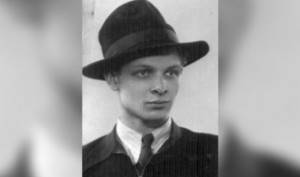
Eduard Khil in his youth
{ In 1960, after graduating from school, Gil was invited to the Opera Studio of the Conservatory, where he sang leading roles in “The Marriage of Figaro”, “The Barber of Seville”, “Eugene Onegin”, “The Queen of Spades” and other classical productions. Having performed the role of Count Elfor in Black Domino, Eduard became a laureate of the White Nights festival. Through this performance he also met his future wife, a ballerina who played the Masked Lady.
Having got a job at Lenconcert, Khil began to include pop numbers in his repertoire, which were no less successful than his opera roles. His interest in the light genre arose thanks to the performances of Klavdia Shulzhenko, whose talent he sincerely admired. In 1962, Eduard first performed a pop repertoire on the stage of the Moscow Central House of Artists, where he was introduced to the public by Leonid Utesov himself. And in 1965 he was already a full participant in the annual Soviet Song Festival, in which the best pop singers of the country performed. Since then, concert organizers began to demand only pop repertoire from Khil.
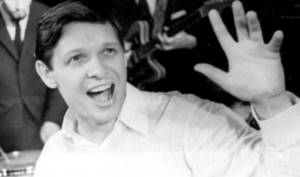
The artist came to the stage from the opera
The artist’s wide popularity was also facilitated by feature films in which his songs were heard. After the release of the film “The Way to the Pier” (1962), the whole country sang “Song about a Friend.” Songs from the films “Taiga Landing”, “An Old, Old Tale”, “I Serve on the Border”, “Front Behind the Front Line” and many others enjoyed the same great success. Eduard Khil - Pensions about a friend Khil brought to the pop stage a light and slightly playful style, very different from the previously accepted strict and restrained manner of performance. His disarming wide smile involuntarily forced people to respond, smile back and forget about their problems for a while. The public could not even imagine what this cheerful and seemingly carefree artist, always fit and immaculately dressed, had to endure. His task was to give people joy and good mood, and Gil did a great job with this.
Gil was one of the main pop stars of those years
The artist successfully represented the country at international competitions, repeatedly became a laureate of prestigious song festivals, and in 1969 he himself headed the jury of a popular competition, where young Lev Leshchenko first announced himself. Khil was able to discern a rising pop star in the aspiring singer and gave him the song “Don’t Cry, Girl,” which soon made Leshchenko famous throughout the country. Eduard Khil - I walk around Moscow Eduard Anatolyevich did not mind sharing his repertoire with beginning performers, because the best composers and poets of the Soviet Union collaborated with him, and almost every second song became a hit. Examples include “At the edge of the forest”, “A coward does not play hockey”, “Where the homeland begins”, “At a nameless height”, “Twice two is four” and many other hits that were sung by the whole country. At that time, Khil’s popularity was comparable to the popular adoration of Yuri Gagarin; they had similar smiles and a sea of charm. Eduard Khil - A coward does not play hockey Khil did not leave television screens and was a regular participant in popular music programs. In the eighties, he himself hosted the author’s program “By the Fireplace,” dedicated to the history of Russian romance. Eduard Anatolyevich invited his students to the broadcasts, whom he taught vocal skills at the Leningrad Institute of Theater, Music and Cinema. Among them were the famous performer of Russian romances, People's Artist of the Russian Federation Oleg Pogudin and the popular film actor Evgeny Dyatlov.
New time
The 90s became a serious test for Eduard Khil.
The Lenconcert collapsed, inflation “gobbled up” monetary savings, and we had to seriously think about our daily bread. Until recently, popular and sought-after artists turned out to be of no use to anyone; they made do with odd jobs and rare performances in provincial cultural centers. Taking advantage of the opportunity, Gil left for France, where he got a job at the famous Parisian casino "Rasputin". Charles Aznavour, Mireille Mathieu, Gilbert Beko came to listen to his performances. His famous compatriots, Yuri Lyubimov, Mikhail Shemyakin, Nikita Mikhalkov, also frequented “Rasputin”. It was very difficult for Eduard Anatolyevich to survive separation from his homeland, and in 1994 he returned home. Two years later, he presented to the audience the musical project “Khil and Sons”, created with the participation of his son Dmitry and the youth group “Prepinaki”. Later, when grandson Eduard grew up, the three of them began performing together with the song “Musical Family,” which became the anthem of three generations of Khils.

Eduard Khil in the early 2010s
In 2010, an event occurred that miraculously returned Eduard to his former glory, making him a household name among young people. From the depths of the Internet, a short excerpt from a 1976 concert unexpectedly surfaced, where Khil performs a vocalise from Arkady Ostrovsky’s song “I’m very glad, because I’m finally returning home.” Eduard Khil - Trololo The video, known online as “Trololo,” instantly went viral and collected millions of views on YouTube. Many parodies appeared on the video, and Khil himself volunteered to record several more versions in different languages. They began to call him “Mr. Trololo” and even invited him on a world tour, which the singer, unfortunately, did not have time to go on.
Eduard Khil - Jr.: Grandfather always had a job, but he was never a star
This year marks seven years since the passing of Eduard Khil. The work of the legendary Soviet artist is continued by his own grandson, the artist’s namesake. However, in an interview with our publication, Eduard Khil Jr. admitted: he may soon leave the stage forever.
The grandson is very similar to his own grandfather: with a smile, voice and even manner of communication. This was appreciated by the audience of the Velvet Season festival, which recently ended at the Sochi Grand Hotel Zhemchuzhina. This is no wonder: Eduard Khil Jr. spent a lot of time with his famous grandfather. However, the guy regrets that the legendary relative was never able to convey to him any professional advice.
“Grandfather left early - I was only fifteen years old,” explains the guy. “Of course, I would like him to help me.” First of all, in terms of vocals, at the moment when my voice was breaking. But it didn't work out. There was no one to help me. Fortunately, there are recordings left - I turn them on periodically, watch them, and try to repeat them! They say it works.
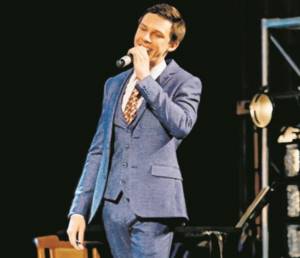
Eduard Khil - Jr.
Eduard Khil never chased big money. It was especially difficult for him after perestroika. The number of concerts of the Soviet pop star has become several times smaller. In order not to die of hunger, he was even forced to go abroad.
— The newspapers write that Gil went to France because he was forgotten in Russia! - continues the artist’s grandson. - This is wrong. Although it was really difficult for our family. It was hard for my grandfather to go through that time. He lived in France for three years. But no one here has forgotten him. When he returned, everyone was happy to see him. In principle, grandfather always had a job. He received fees for concerts, but never became a star, did not try to earn crazy money. He was a modest man, Soviet. What he had was enough for him!
Khil left a modest inheritance: an apartment in St. Petersburg, a dacha in the suburbs and a car. The grandson admits that his grandfather passed away at the peak of his popularity. Two years before his death, his hit “Trololo” unexpectedly exploded on the Internet. Thanks to this, Gil became known all over the world.
“This video had forty million views—record numbers at that time,” the grandson continues. - I remember this period well - in 2010, the phone in the apartment was literally ringing off the hook. They called from Australia, from America. They offered a lot of money: “Come, we are ready to fulfill all your conditions. Just perform "Trololo". It was already difficult for my grandfather to resolve such issues, so my dad supervised his tours. He just hung up when another call rang.
Eduard Khil Jr. does not yet have such a demand. But his fees are enough to buy new suits.
“In the last three years I have had more concerts,” continues Eduard. — I don’t have a permanent director yet, my dad helps. Sometimes I organize things myself. I am invited mainly by those who remember my grandfather. Although I don’t sing like him, I try! I also perform “Trololo”. This song is actually a very complicated thing. It needs a good range. In general, I don’t know whether I will continue performing. I just recently graduated from college. I need to decide what to do next. I don’t rule out the possibility that I’ll finish performing and move on to another field of activity.
Not long ago there was a commotion in the Khil family. And all because of the editors of Andrei Malakhov, who found the allegedly illegitimate daughter of a popular singer.
“They called my father: “Dmitry, could you come to Moscow and take part in our program,” says the artist’s grandson. “Eduard Khil’s daughter has turned up.” Of course, we didn’t believe this story right away. Because we saw the relationship between grandparents, they are ideal. And grandfather could not have had any outside connections. As for me, I have a girlfriend. We met her at the Institute of Culture, where we studied. And we've been together for two years now.
Personal life of Eduard Khil
Eduard Khil met his beloved and only wife, ballerina Zoya Pravdina, at the Opera Studio of the Leningrad Conservatory while working on the play “Black Domino”. Mutual sympathy soon grew into a strong real feeling, and the lovers got married.
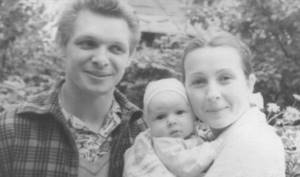
Eduard Khil with his wife Zoya Pravdina and son
In 1963, the couple had a son, Dmitry. He followed in his father’s footsteps, graduated with honors from the M. I. Glinka Choral School at the State Academic Chapel and became a composer, arranger and performer of his own songs.
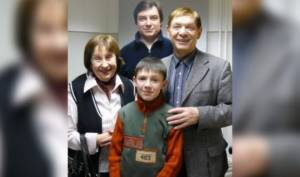
Family of Eduard Khil
The artist’s grandson, Eduard Khil Jr., also graduated from the same educational institution, to whom the famous grandfather also instilled a love of music and the stage.
Interesting facts from the life of Eduard Khil
- Zoya Aleksandrovna Pravdina was the first to propose marriage. In a veiled form. She offered to move her beloved from the hostel to her and her mother’s apartment on Fontanka. Edward said: “What will your neighbors and your acquaintances say? Let's get married!". Zoya, pretending to think, agreed. The trip to the registry office took place the next day.
- The singer’s wife said that Edward was accepted everywhere as “one of their own.” On tour in the Baltic states he was considered a Baltic, in Odessa he was considered a Jew. From the hall I could hear: “Tell me! Are you ours?
- There was a year-long break in the vocal performer's work. Returning from a tour in Yugoslavia, Eduard Anatolyevich noticed that something was happening with his voice. Doctors discovered a nodule on the vocal cords and pronounced a verdict that her singing career was over. But there was a doctor who decided to perform the operation. Everything went well. The singer spoke in a whisper for a whole year and stopped singing. But little by little everything returned to normal, and the artist’s career continued.
- Eduard Khil had a “conflict” with the military. During one of the “important” concerts, the singer performed a comic song “How good it is to be a general!” Right during the performance, military men with stripes on their pants began to leave the hall. At that time, the generals had influence that could put a barrier to public performances of the joker. The vocal performer was defended by Yuri Gagarin. He liked the song and liked the work of Eduard Anatolyevich.
- “Tolstoy’s House”, where the artist lived (Rubinshten St., 15-17) was located just opposite Lenconcert. Across the river - Fontanka. In winter, when the water froze, in order to avoid making a detour across bridges, Eduard descended from the embankment onto the ice using a rope ladder. I crossed to the other side of the river and found myself at work.

Today, songs from the repertoire of Eduard Anatolyevich Khil are performed by another Eduard Khil (Dmitrievich, grandson). The creative dynasty continues
Death and memory
On April 8, 2012, the artist was preparing to leave for a tour to Germany and went with his wife to the hairdresser to get his hair in order. As soon as he sat down in the chair, he suddenly slid to the floor and lost consciousness. An ambulance was called and took the singer to the Mariinsky Hospital in St. Petersburg, where he was diagnosed with a severe stroke with hemorrhage at the base of the skull. Documentary film about Eduard Khil from Channel One Three weeks later, Khil was transferred to the intensive care unit of the Polenov Institute, but no measures helped restore brain activity. Eduard Anatolyevich spent two months in a coma, connected to machines, and all this time his wife, son and grandson were on duty at his bedside. On the advice of doctors, they played his favorite music in his headphones. But the miracle did not happen. On June 4, 2012, the artist died without regaining consciousness.
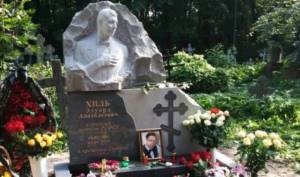
The grave of Eduard Khil
Khil was buried at the Smolensk cemetery in St. Petersburg. On the occasion of the eightieth anniversary of his birth, a two-meter granite bas-relief was installed on his grave. One of the city’s public gardens on the Neva, a boarding school for gifted children in Ivanovo and school No. 27 in Smolensk, where he studied, were named in honor of the artist.
Son of Eduard Khil: Only I am to blame for my father’s death!
21 June 2012, 02:24 | Author: Ivan Rutov
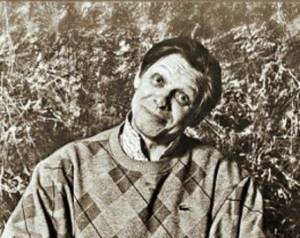
photo:
In recent years, it has gained popularity after several years of oblivion. He tried to use the fame that had fallen on him to earn more money.
Anna Korobova
Just a couple of months ago, Eduard Khil spoke with enthusiasm about his truly grandiose plans. He was going to release an album, he said that he was invited to perform concerts abroad... On that ill-fated day, when he had an attack in the hairdresser, he told the master that he was going on tour. And then he sharply threw his head back to give him the opportunity to wash his hair before cutting... They say it was this sudden movement that triggered the stroke. After his vocalization “Trololo,” or “I’m very glad, because I’m finally coming home,” became an Internet hit in 2010 and Gil became famous throughout the world, receiving the nickname “Mr. Trololo,” his quiet life as a pensioner changed dramatically. A new wave of popularity came, which turned out to be even more powerful than the first, the one that was still in the USSR, because now his name was known even overseas. And this, of course, made him happy. But, on the other hand, the load on the body of the 75-year-old singer has increased a hundredfold. Khil was invited to filming - he came, to a corporate event - of course, to the birthday of a financial tycoon - he was always happy. Eduard Anatolyevich believed that the stage is the best healer, it will heal if you have a heart attack or suddenly feel dizzy. The singer's family was also held hostage. On the one hand, the family rejoiced at the new round of success, on the other hand, they understood that Eduard Anatolyevich would not be able to withstand such a frantic regime for long. But he agreed to concerts again and again. Let’s be honest – for the sake of money. The People's Artist's pension was only 11 thousand rubles. In one of the interviews, he admitted that he spends nine thousand to pay for the apartment, two thousand for the phone... And he also tried to help his son. Eduard Anatolyevich’s relationship with his son Dmitry has always been warm. Khil supported him in his desire to become a musician, but Dmitry’s creative destiny did not work out. His father helped him create his own musical group, “Khil and Sons,” and pressed the release of a disc with romances, which, as they say, did not bring any profit. And of course, when fame smiled at him again at sunset, he tried to use this chance - to support his family financially. “Mom still doesn’t believe that dad is not alive,” says Dmitry Khil. – My son Edik and I are next to her all the time, you never know... She constantly cries and does not part with her father’s photograph. I'm very worried about her. Now Dmitry and Edik, named after their famous grandfather, are trying not to leave their mother and grandmother Zoya Alexandrovna for a minute. “Dad never complained about anything,” recalls Dmitry Khil. “He didn’t like to talk about his illnesses. Only my mother knew about them, but my father always asked her not to tell me about it so that I would not worry. He was an amazingly sunny person. Always, even in the most sorrowful moments, I tried not to lose heart and see only the good. This is such a rare quality now. We will never forget you, father... Dmitry admitted to our correspondent that he reproaches himself for not persuading his father to go to the doctor when he noticed that not everything was going well with his health... Now he has to release an album in memory of his father, explain to the organizers, resolve problems with sold concert tickets... Immediately after Khil’s death, a heated debate broke out among fans of his work on social networks over whether the doctors had done everything to save their idol. Many believe that if the artist had been taken to the Polenov Research Institute of Neurosurgery a few days earlier, he could have been saved. – I heard that many fans blame doctors for dad’s death. They are not to blame for anything! – says the artist’s son. “The doctors did everything in their power. But, apparently, everything is God’s will. They write that dad died of cardiac arrest. When he was paralyzed, doctors and nurses looked after him for a long time, they turned him over so that there were no bedsores. And I think that during one such rollover, a blood clot broke loose, and my father died almost instantly. But I don't blame anyone. Only himself... Information Eduard Khil was born in 1934 in Smolensk. Graduated from the Leningrad Printing College. He worked at an offset printing factory and participated in amateur performances. Then he entered the Leningrad State Conservatory. N. A. Rimsky-Korsakov. In the early 60s, Khil was a soloist at Lenconcert. He is a multiple winner of international and all-Union competitions. In 1991–1994 worked under contract in the famous Parisian cabaret "Rasputin". Gil is the first performer of the songs “Lumberjacks”, “Song about a Friend”, “Blue Cities”, “How the Steamships See Off” and many others.
Eduard Khil was admitted to the Mariinsky Hospital in St. Petersburg with an ischemic stroke in early April. Later he was transferred to the Polenov Institute. His wife Zoya Alexandrovna and son Dmitry were nearby all the time. They hoped for a miracle until the last moment. But it didn’t happen... The singer died on the night of June 4 at the age of 78. The wonderful artist was buried at the Smolensk cemetery in St. Petersburg.
Connect to our Yandex Zen to keep abreast of events in Russia and the world
